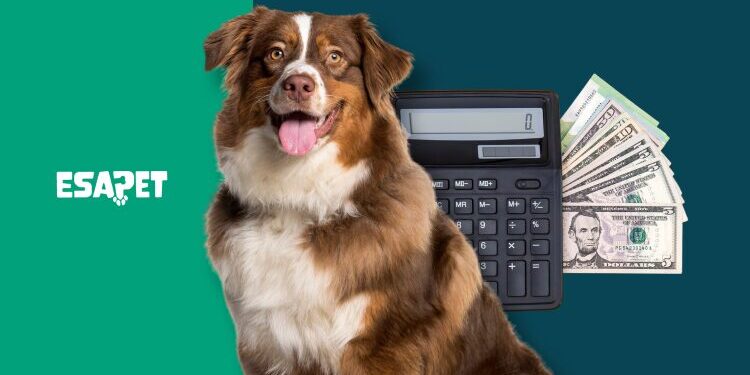Pet Fees vs. Pet Rent vs. Pet Deposits: Key Differences

Understanding the differences between pet fees, pet rent, and pet deposits can be confusing — especially for tenants who have an emotional support animal (ESA). Federal laws like the Fair Housing Act (FHA) provide specific protections for ESA owners, and knowing which charges are legally allowed—or prohibited—is essential. In this comprehensive guide, we’ll break down each type of charge and explain how they apply (or don’t apply) to ESA housing situations. This way, you’ll be fully prepared to assert your rights and avoid unfair fees in your rental agreement.
What’s the Difference Between Pet Fees, Pet Rent, and Pet Deposits?
A pet fee is a one-time charge paid upfront that isn’t refundable. Pet rent is a monthly charge added to the regular rent because the tenant has a pet. A pet deposit is also paid once, but can be refunded if there’s no pet-related damage, similar to a regular security deposit.
Pet fees, pet rent, and pet deposits are financial burdens associated with owning animals on property or in establishments, but they are treated differently when it comes to service animals and emotional support animals.
Pet Fees
These are usually one-time, non-refundable fees charged by property owners or businesses to individuals who bring pets onto the premises. However, when it comes to service animals and emotional support animals (ESAs), individuals with disabilities cannot be required to pay maintenance or cleaning fees, even if such fees are typically imposed on pet owners—because service animals and ESAs are not legally considered pets.
In the United States, emotional support animals (ESAs) are protected under the Fair Housing Act (FHA). This federal law prohibits housing discrimination based on disability and requires landlords to provide reasonable accommodations to individuals with disabilities — which includes allowing an ESA without charging extra pet-related fees.
Exceptions:
- If the ESA causes actual damage, the landlord can charge for repairs.
- If the animal is dangerous or destructive, landlords may deny the request.
How to Avoid Pet Fees in Rental Unit and Hotels
To legally avoid pet fees in rental units and some lodging, your animal must qualify as an Emotional Support Animal (ESA) or a Service Animal. Under the Fair Housing Act (FHA), landlords must provide reasonable accommodation for tenants with ESAs, waiving pet rent, deposits, and breed/size restrictions—even in “no pets” housing. To qualify, tenants must obtain a valid housing ESA letter from a licensed mental health professional confirming a disability-related need.
In hotels, ESAs are not covered under the FHA, but Service Animals, including Psychiatric Service Dogs (PSDs) trained to perform tasks, are protected under the Americans with Disabilities Act (ADA). Hotels must allow service dogs without charging pet fees and may only ask limited questions about their function—not documentation.
Pet Rent
Refers to an additional monthly rent or monthly fee paid by pet owners in addition to their regular rent. Unlike pet fees, pet rent is a recurring monthly charge rather than a one-time payment.
Pet rent usually ranges from $10 to $100 per month depending on the location and type of pet. For service animals and emotional support animals, housing providers cannot charge pet rent or any other fees or rent due to the animal, even if they charge such fees to other tenants.
Exceptions (When Fees May Apply)
While landlords cannot charge pet rent for ESAs or service animals, they may:
- Request documentation: A valid ESA letter from a licensed mental health professional (for ESAs).
- Charge for damages: If the animal causes damage to the unit, the tenant can be held financially responsible.
- Deny the request: If the animal poses a direct threat to the health or safety of others, or causes substantial property damage.
How Much is Pet Rent?
Pet rent is a monthly fee that typically ranges from $25 to $100 per month, per pet, depending on factors like location, pet type, and rental property policies. Urban areas or high-demand markets tend to charge more, and larger or potentially destructive pets may incur higher fees.
Common ranges for pet fees are $100-$500 (one-time, non-refundable), for refundable deposits are $200-$500+, and for pet rent are $25-$100+ per month.
Pet Deposits
These are refundable amounts required by landlords or businesses that can be used to cover any damages caused by the pet. In the context of service animals and emotional support animals, federal law prohibits housing providers from requiring a pet deposit or a special deposit for service or emotional support animals, as these are not considered pets. Waiving a pet deposit may be considered a reasonable accommodation.
This year, average pet deposits typically range from $200 to $600 and pet fees range from $250 to $500 per pet. In the context of service animals and emotional support animals, federal law prohibits housing providers from requiring a pet deposit or a special deposit for service or emotional support animals, as these are not considered pets. Waiving a pet deposit may be considered a reasonable accommodation.
Exceptions (When a Deposit May Be Charged)
While landlords cannot charge a specific pet deposit for an ESA or service animal, they may still charge tenants for:
- Actual damage caused by the animal, after it occurs (just as they would for any tenant-caused damage).
- Excessive wear and tear beyond what is considered reasonable.
- A general security deposit that applies to all tenants equally (but not an extra one due to the animal).
- The tenant fails to provide proper documentation (for an ESA).
- The animal poses a direct threat to the health or safety of others.
- The animal has a history of causing substantial damage to property.
In short, while pet fees, pet rent, and pet deposits are common practices for pets in general, federal law and regulations (such as the Americans with Disabilities Act (ADA) and the Fair Housing Act (FHA)) protect people with disabilities from having to pay these fees for their service animals and emotional support animals. However, the animal’s owner may still be charged for any physical damage the animal causes to the property if this is a standard policy applied to all tenants or guests.
Is it Legal to Charge Pet Rent and Pet Deposits?
Yes. Landlords can generally charge pet rent and pet deposits, but the rules vary by state and city. Charges should be reasonable, clearly stated in the lease, and may be subject to local caps or refundability requirements.
Local examples: In California, landlords may charge pet-related costs, but deposit limits and local rent-control rules can restrict how much can be collected and whether certain fees can be non-refundable. In Washington, D.C., pet-related charges may be capped (e.g., limits tied to monthly rent).
How to protect yourself: Document the unit’s condition at move-in and move-out with photos or video to avoid unfair deductions. You may also be able to negotiate lower pet rent by offering stronger documentation, a pet resume, or a higher refundable deposit where allowed.
Important: Service animals are exempt from pet fees, pet rent, and pet deposits under federal law, and ESAs may also be exempt in housing contexts depending on applicable rules.
Emotional Support Animals and Housing Laws
Emotional support animals are to be given reasonable accommodations per the FHA. Per ESA laws, there are very few exceptions that reasonable accommodation for an emotional support animal can be denied in a housing unit.
What Landlords Cannot Charge for ESAs?
Landlords cannot legally charge pet fees, pet rent, or pet deposits for a tenant’s emotional support animal, as long as the tenant provides a valid ESA letter. ESAs are protected under the Fair Housing Act (FHA), which classifies them as assistance animals rather than pets. Because of this, landlords must treat ESAs as a form of medical accommodation, not as optional companions subject to pet-related charges.
Prohibited Fees for Emotional Support Animals
Under the FHA, it is prohibited to charge any additional fees, deposits, or rent for an emotional support animal. This includes upfront non-refundable fees, monthly pet rent, or deposits that would only apply due to the presence of the ESA. These rules are in place to ensure that individuals with mental or emotional disabilities have equal access to housing without being burdened financially.
Is It Legal to Charge Pet Fees?
It is legal for landlords to charge pet fees for regular pets, but not for ESAs. If a landlord insists on charging a fee for your ESA, it may constitute a violation of federal housing laws.
Is It Legal to Charge Pet Rent and a Pet Deposit?
For standard pets, yes—charging both pet rent and pet deposits is legal. For ESAs, charging either is illegal, unless the ESA causes damage and the landlord uses the general security deposit for repairs.
Are There Any Exceptions to These Rules?
Although ESAs are generally exempt from pet-related fees, there are a few limited exceptions. If an emotional support animal causes significant property damage or poses a direct threat to the safety of others, the landlord may take appropriate action, including using the standard security deposit to cover repairs. However, the landlord cannot preemptively charge pet-related fees simply because a tenant has an ESA.
What Landlords Can Do?
While they can’t charge pet-related fees:
- They can request documentation verifying the need for the ESA, like an ESA prescription Letter.
- They can charge for actual damage caused by the ESA.
- They can deny the ESA if it poses a direct threat to others or causes significant property damage.
What Should I Do if My Landlord Is Charging Me Pet Fees for My ESA?
If a landlord attempts to charge pet fees for your ESA, the best course of action is to inform them of your legal rights under the FHA and provide a valid ESA letter from a licensed mental health professional. You may also want to submit a written request for reasonable accommodation. If the landlord refuses to comply, you can file a complaint with the U.S. Department of Housing and Urban Development (HUD).
Reasonable Accommodation Under the FHA
What Is the Process for Requesting a Reasonable Accommodation for an ESA?
Requesting a reasonable accommodation involves submitting a formal letter to your housing provider, stating your need for an ESA due to a mental or emotional disability. This letter should be supported by documentation from a licensed mental health professional (LMHP). Once received, the landlord must evaluate the request in good faith and respond within a reasonable timeframe.
Requirements for an Animal to Be Recognized as an ESA
To qualify an animal as an ESA, you must have a documented mental or emotional condition that substantially limits one or more major life activities. The animal must provide therapeutic support to alleviate symptoms of your condition. There are no training requirements, and the animal does not need to perform specific tasks—but the need must be verified by a qualified LMHP.
Valid ESA Letter
A valid ESA letter must be written by a licensed mental health professional and include the provider’s license number, the date of issuance, and a statement that you have a condition qualifying you for an emotional support animal.
Licensed Mental Health Professional (LMHP)
Only certain professionals can legally issue an ESA letter, including psychologists, psychiatrists, licensed clinical social workers, and other LMHPs. General practitioners are typically not accepted unless they are specifically trained in mental health care.
Documentation Requirements
Proper documentation must clearly outline your need for an ESA and confirm that your animal serves a legitimate therapeutic purpose. The letter must be current (typically within one year) and meet all HUD guidelines.
FAQ about Pet Fees, Pet Rent, and Pet Deposits
No, you do not have to pay a pet fee for an emotional support animal. These charges are considered discriminatory under the Fair Housing Act because they place an unfair financial burden on individuals with disabilities.
No. Pet rent cannot be charged for emotional support animals, as they are not classified as pets under the FHA. Tenants with a valid ESA letter are exempt from this recurring charge.
No. Apartments cannot charge pet rent for ESAs. Doing so may result in legal consequences for the housing provider.
No. Landlords are not allowed to collect a pet deposit for an ESA. A standard security deposit may still apply, but only if it would apply to all tenants regardless of pet status.
For regular pets, landlords can charge a deposit per animal. For ESAs, this is not allowed—even if the tenant has multiple animals, as long as they’re recognized as ESAs and serve a valid therapeutic purpose.
If you paid a pet deposit before presenting your ESA letter, you may be entitled to a refund. You can request the amount be returned, and if the landlord refuses, consider filing a HUD complaint.
Yes. While landlords cannot charge special pet deposits for ESAs, they can use the general security deposit to pay for damages caused by any animal, including emotional support animals.
There is no strict limit, but each animal must be individually justified by a licensed mental health professional. The landlord may deny excessive requests if the number of animals poses a legitimate health or safety concern.
In most cases, no. The FHA does not allow breed restrictions for ESAs, unless the animal poses a direct threat to others or the property.
Conclusion
Knowing the difference between pet fees, pet rent, and pet deposits is key to protecting your rights as a tenant—particularly if you have an emotional support animal. Under the Fair Housing Act, ESAs are not considered pets, meaning landlords cannot charge standard pet-related fees for them.
However, they can still hold you responsible for actual damage caused by your animal. By understanding how to request reasonable accommodation, keeping proper ESA documentation, and staying informed about your legal rights, you can avoid unlawful charges and ensure a supportive, accessible housing experience.
If you believe your rights are being violated, consider seeking legal advice or filing a complaint with the U.S. Department of Housing and Urban Development (HUD).

Psychiatric Service Dog, ESA and Service Animal Rights, Service Animals
Mini Horse Service Animal: What Can It D...
Brenda Mejia
Dec 12 2025

ESA and Service Animal Rights, Psychiatric Service Dog, Service Animals
Service Dog Laws: Understanding Rights a...
Jonalyn Dionio
Dec 12 2025

